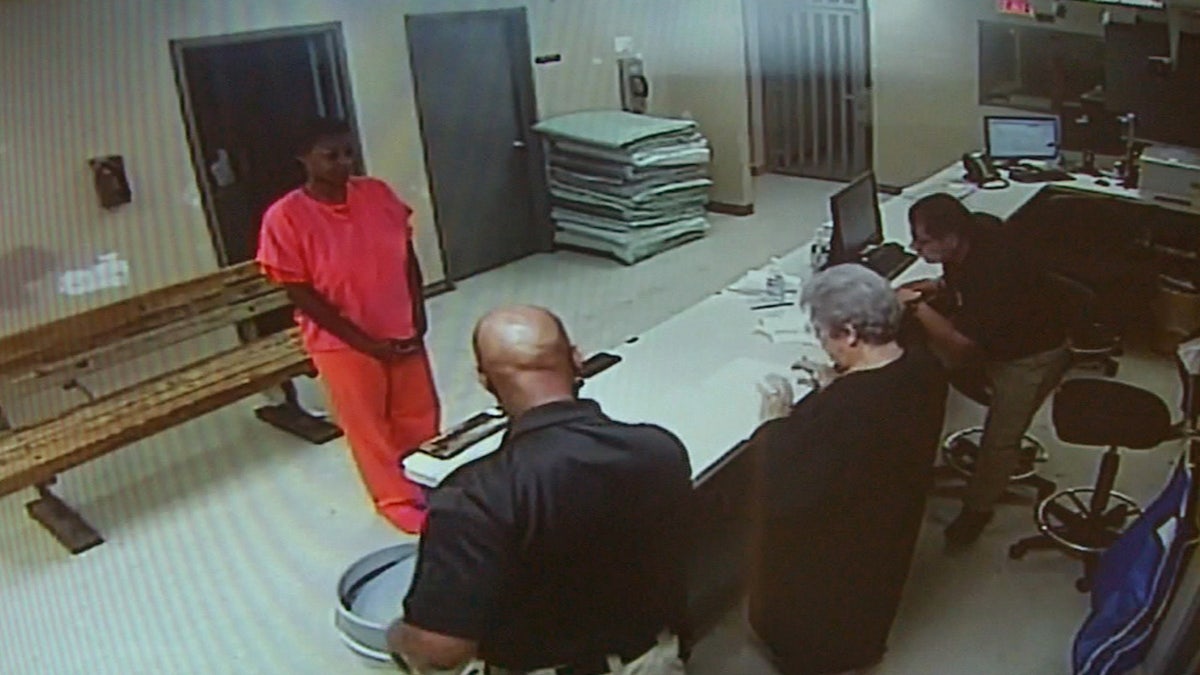
FILE - In this undated file image made from video provided by the Waller County Sheriff's Department, Sandra Bland stands before a desk at Waller County Jail in Hempstead, Texas. The small-town Texas jail where Sandra Bland died last summer needs to be replaced, and its jailers need body cameras and anger-management training, according to a report issued Tuesday, April 12, 2016 by a panel convened after Bland's death. (Waller County Sheriff's Department via AP, File)
DALLAS – The small-town Texas jail where Sandra Bland died last summer needs a new building, more expertise among its staff to identify mental health issues, and body cameras and anger-management training for its jailers, according to a report issued Tuesday by a panel convened after Bland's death.
The sheriff's office in Waller County agreed to have outside experts review the county jail in Hempstead, about 50 miles northwest of Houston after Bland died. Bland, who was black, was jailed after a state trooper pulled her over in July for a minor traffic violation. Dashcam video of her arrest and the circumstances of her death provoked national outrage and drew the attention of the Black Lives Matter movement.
Video of the stop near Houston shows the trooper, Brian Encinia, yelling at Bland, then pulling a stun gun and saying, "I will light you up!" Encinia has pleaded not guilty to a misdemeanor perjury charge stemming from the stop. He has also been fired.
Bland, who was in the process of moving to Texas from the Chicago area, was found dead in the Waller County Jail three days after her arrest. Authorities said she was hanging from a jail cell partition with a plastic garbage bag around her neck. A medical examiner ruled it a suicide and a grand jury declined to indict any sheriff's officials or jailers in her death.
Bland's supporters have questioned whether the jail's conditions had anything to do with her death.
While the panelists who presented their jail report at a news conference Tuesday in Hempstead mostly stayed away from specifics about Bland's death, their recommendations target mental health screenings and the overall treatment of inmates.
One panelist, former U.S. Rep. Craig Washington, said anyone entering the jail was "entitled to be treated with dignity and respect as a human being."
Ultimately, that will require a new facility with more space, he said.
"The jail is not adequate, in our judgment," Washington said.
The panel also called on the sheriff's office to develop a policy for storing video footage and to purchase body cameras. It also said the jail should employ medical personnel who can screen incoming inmates for mental health issues.
Jailers supervising inmates should be separated from the officers who arrested them, the panel said. And jailers should undergo anger-management courses and routine evaluations.
Authorities have already said that Bland indicated on an intake questionnaire that she once tried to kill herself and was taking medication for epilepsy. Following her death, the Texas Commission on Jail Standards cited the jail for not observing inmates in person at least once every hour and not documenting that jailers had undergone training on dealing with potentially suicidal inmates.
Waller County Sheriff Glenn Smith said he liked the report and was already starting to implement parts of it. He said jail staff would undergo "de-escalation" training in June, and that the county has already applied for a state grant to purchase body cameras.
"I'm open, willing to listen, and while we may not all agree on everything ... we're going to move forward," Smith said. "We're going to make a difference."
But the news conference was contentious at times. One person questioned why more attention wasn't paid to the high fees many jails charge inmates to make phone calls. Another accused Washington of being used by authorities to cover up their mistakes in Bland's case, to which he angrily replied, "You're absolutely wrong."
If the sheriff's office implements the report, Washington said, "I bet you six months from now, a year from now, we'll turn around and say, 'Wow, look at what they did in Waller County.'"
Bland's family has sued the county and the trooper who arrested her.
"It shouldn't take somebody dying to be self-reflective," said the family's attorney, Cannon Lambert, who had not seen the report.
"It may be a legacy that Sandy leaves that through her death, advances are made," Lambert added. "To that end, obviously, we would hope that problems at the jail get rectified."









































